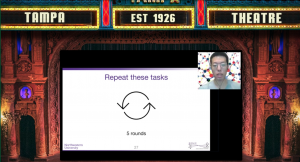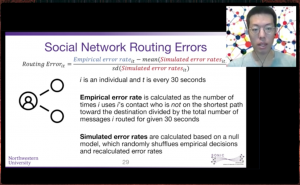SONIC at the Undergraduate Research & Arts Exposition
- Going for Broke: Brokerage Behavior in Organizations (Ahan Sahu)
- An application of Bayasian Autologistic Actor Attribute Models (ALAAM) to Study Social Networks and Their Influence on Human Behavior in Rural Kenya (Othman Muhammad)
- The effect of leadership behaviors and technology use on the perception of team outcomes during the COVID-19 pandemic (Rohil Bahl)
- Let’s Team Up! Understanding How People Form Teams Using Online Platforms (Selena Suarez)
Going for Broke: Brokerage Behavior in Organizations
Contractor’s talk at Vikram Sarabhai Birth Centenary Tribute featured at The Hindu
At the Vikram Sarabhai Birth Centenary Tribute, Contractor highlighted the role and impact of satellite television from four met theoretical viewpoints. His talk is featured last Friday (02/19) on The Hindu. Click here to read the article.
Noshir and Leslie will be delivering the Welcome Plenary at INGroup 2020

SONIC at OCMC 2020
Although this year’s OCMC 2020 have a different feel (i.e. virtual conference), we are delighted to announce that four of our graduate students (Diego Gomez-Zara, Jasmine Wu, Kyosuke Tanaka, and Niloufar Izadinia) were presenting there!
Diego Gomez-Zara kicks off our SONIC speakers on Friday (09/25) at OCMC 2020 with his poster presentation titled “Do I know you? The effects of social capital on self-assembled teams.”
On Saturday (09/26), Jasmine presented her work on “Status and network mobilization in organizations during the times of COVID-19,” while Niloufar presented her work on “New metrics for evaluating individual and team performance in multi-team systems” during poster session.
On Sunday (09/27), our 6th year graduate student Kyosuke Tanaka also presented his talk on “Positional and Dispositional Factors That Predict Who Commits Social Network Routing Errors and Who Learns from Them” during the Organizing Online and Offline Session.


Find out more about the conference here.
Networks in the News: Global labor flow network reveals the hierarchical organization and dynamics of geo-industrial clusters
A research paper by Park et al.
While there are existed studies on geo-industrial clusters, researchers have been lacking extensive empirical data to capture the organic and emergent nature of clusters and their dynamics for the global economic context. To address this research gap, recently, researchers in Indiana University and LinkedIn constructed a global labor flow network to examine the organization and evolvement of economies. Using a rich LinkedIn’s employment history data set, they focused on the flow (job transitions of workers) between firms, industries, and regions. Their results shed light on a new systematic approach to identify geo-industrial clusters and informed future economic analysis.
Read the paper here: https://www.nature.com/articles/s41467-019-11380-w
Networks in the News – Latent Space Models for Cognitive Social Structures
A recent article by Daniel Sewell develops a new approach for Cognitive Social Structures (CSS) data. Although there have been several models for CSS, his latent space models better capture micro-structures of CSS and provide insights into respondents’ perceptions.
If you’re interested in the paper, it’s available: https://www.cambridge.org/core/journals/network-science/article/latent-space-models-for-network-perception-data/0D24F6D47F4FF81EE19AAC083DADEB35.
Networks in the News – Simple vs. Complex Secrets
A recent American Journal of Sociology article by Georg Rilinger develops a relational theory of complex secrets which explains how corporate crimes often remain secrets even after the fact that critical information has been revealed. The author argues that this type of secrets (i.e., complex secrets) is not enough to be identified secrets as “things,” compared to simple secrets (i.e., discovering a fact reveals a secret). Rather, it requires those who discover secrets to (a) find whole sets of information and then (b) assemble them properly based on a guiding conception. The author demonstrated the case of complex secrets using the Insull’s Ponzi scheme in the 1920s and 1930s. In particular, in this scandal, there were four FTC investigations and early ones failed. The author illustrated that despite the fact that all the investigations had the same sets of information, the early ones relied on a misguided conception, which prevented them from successfully discovering the complex secrets.
If you’re interested in the article, go visit: https://www.journals.uchicago.edu/doi/abs/10.1086/702730
Large teams develop and small teams disrupt science and technology
A research article by Lingfei Wu, Dashun Wang, and James A. Evans.
One of the most universal trends in science and technology today is the growth of large teams in all areas, as solitary researchers and small teams diminish in prevalence. Increases in team size have been attributed to the specialization of scientific activities3, improvements in communication technology, or the complexity of modern problems that require interdisciplinary solutions. This shift in team size raises the question of whether and how the character of the science and technology produced by large teams differs from that of small teams. Here we analyse more than 65 million papers, patents and software products that span the period 1954–2014, and demonstrate that across this period smaller teams have tended to disrupt science and technology with new ideas and opportunities, whereas larger teams have tended to develop existing ones. Work from larger teams builds on more-recent and popular developments, and attention to their work comes immediately. By contrast, contributions by smaller teams search more deeply into the past, are viewed as disruptive to science and technology and succeed further into the future—if at all. Observed differences between small and large teams are magnified for higher-impact work, with small teams known for disruptive work and large teams for developing work. Differences in topic and research design account for a small part of the relationship between team size and disruption; most of the effect occurs at the level of the individual, as people move between smaller and larger teams. These results demonstrate that both small and large teams are essential to a flourishing ecology of science and technology, and suggest that, to achieve this, science policies should aim to support a diversity of team sizes.
Link: https://www.nature.com/articles/s41586-019-0941-9
Networks in the News – The Determinants of Sharing Strategy in a Wi-Fi Sharing Game
A new study by the Human Nature Lab at Yale University explored how people allocate a limited, but personally usable, resource (e.g., unused Wi-Fi bandwidth) to their neighbors. Based on results from a Wi-Fi sharing game that the authors developed, the study found that (a) network density (i.e., the extent which people are connected with each other in the network) impacts the inequality of Wi-Fi sharing, and (b) those who benefit from Wi-Fi sharing at most tend to have many neighbors who in turn have few neighbors.
If you’re interested in the study, it is available: https://www.nature.com/articles/s41467-019-08935-2
